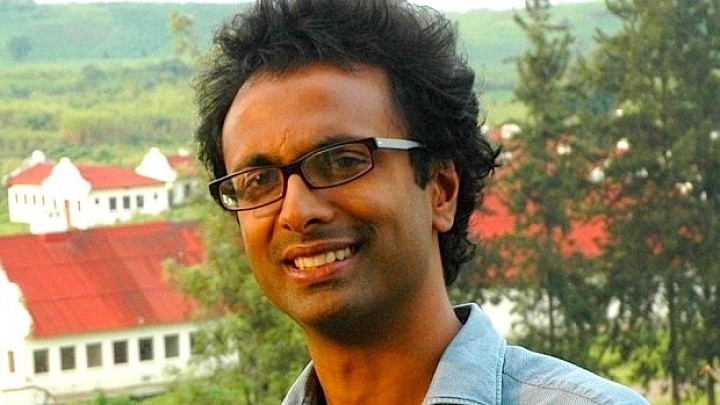Anjan Sundaram on Life as a Stringer in the Congo

In 2005, Anjan Sundaram was a recent graduate in mathematics with an Ivy League education and cushy investment bank offer when he began to think that mathematics was about the beauty and not its usefulness, and said he needed something more real. So he traded it all in to be a stringer for the AP and New York Times in the Democratic Republic of Congo (DRC), among the most dangerous war zones in the world.
Soon after arriving in the DRC with barely the clothes on your back, you found yourself getting robbed in broad daylight. How did you not just decide to throw in the towel and say, You know, its just not worth risking my life to tell this story? I guess, describe a bit your goals going in and how you got off the ground running, as it were.
I was in a constrained environment. There was all this stuff happening, conflict all over and its associated effects. It just wasnt even getting reported. I was just scrambling to try to get to these places, so that it went into the public record. Thats the kind of situation I was operating in. I didnt have a huge budget. Sometimes I was funded but often I would go on my own, hitching rides or getting free flights. I didnt go in with grand ideas to get people to care about the Congo. My goal, ambition, and means were more limited.
How did you avoid being used as a journalist? Did you ever worry that people telling you stories might be lying?
I think a healthy skepticism is helpful, as you point out. In humanitarian circles, a whole lot of propaganda is given out. Aid agencies have strong PR branches that say theyre doing good which may not always be the case. Are people using us to help them? After all, we are making a living off these stories, so it goes both ways. Trust or a reason not to trust exists on both sides. Did people make up things? Perhaps, and this is where reporting makes a difference. When you can ask peopledirectly to their faceand can see for yourself the conditions they are living in, whereas on the phone its far more complicated.
It was my personal idea to see and understand the larger reality behind these storiesThe attraction of war was the other thing about itI was interested in seeing something major. I did not understand the dynamics of violence and the DRC was a place to do that.
You have this very unlikable character Bentley, who seems to sum up everything wrong with foreign journalism pompous, wowed by power, yet holed up in a Four Seasons-like hotel, far from the action and the violence. You lived in a dangerous part of DRC. How were your experiences at reporting different? Do you think foreign journalism today is a bit too risk-averse? Do you need to be out of the capital to be a stringer?
Its essential. If you want to get at the realities and describe it with accuracy, you need to live among them. Every day Id come back and wed eat and around table I would mention some story I was working on and have these conversations with my Congolese family or hang out with people in the dark when the electricity was out and theyd ask what I was writing about it. It would come back to me that actually theres a twist or theyd say hes not what he says he is. So I would have more context and accountability. I could not get away with just preconceived ideas and simple narratives. They gave me leads to pursue to understand better what was happening.
For political reporting it may have been better to be at fancy hotel because thats where the elites hang out. I had their phone numbers and called them for comment but those werent the people I was interested in portraying the lives of. There were few people in that elite class that were interesting to me.
Do you ever worry about trafficking in cliches about the Congo with your reporting? It felt like every story I read a few years back was about the conflict minerals that make up our iPhones.
In my case there were relatively few moments where it was just a cliche. Once, they had me fly with Kofi Annan to Kigali and I flew with a hoard of journalists. It was the most meaningless and boring journey. He said little, and I didnt feel like we were reporting anything that hadnt been said. Naturally Kofi Annan and big public figures generally resort to the global narrative about Congo, which is replete with cliches. For the most part, I was defining my own agenda. Sometimes they got published and sometimes they wouldnt.
What is a popular myth or misconception about the Congo that bothers you?
Mine is that all of Congo is at war, and that this war is intensely chaotic and the country is full of victims. Its much more complex than that. War is only in the east, though there are some outbreaks of violence in the west, but nothing sustained. Ev
